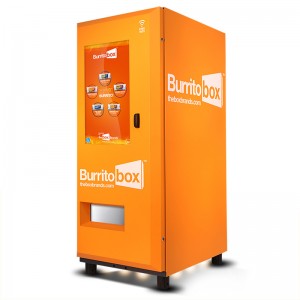Burritobox food kiosk launches on campus
On Tuesday, USC became the first university in the United States to have a Burritobox available to its students on campus.

Boxito · The company chose USC for the location of its first college launch due to its “cutting edge state-of-the-art campus.” – Photo courtesy of Burritobox
Advertised as “the World’s First Burrito Kiosk,” Burritobox is essentially a vending machine offering hot and fresh burritos. The kiosk will be located near the Parkside Apartments at 3730 S. McClintock Ave.
Kris Klinger, director of USC Hospitality, said that Burritobox specifically reached out to the university to offer its services.
“Burritobox wanted us to be the first campus to offer their service to our students, [and] we also thought it was something cool, convenient and affordable that those on campus would enjoy,” Klinger said.
Klinger and his team visited the first Burritobox location at a gas station in West Hollywood to check out the kiosk and see what others thought of the product.
Patrons can order from Burritobox through an interactive touchscreen menu. Customers can choose up to five different burrito options.
All burritos are refrigerated prior to the heating process and Burritobox employees service the machine daily to ensure freshness. Additionally, they are made with hormone- and antibiotic-free ingredients. Excluding tax, the burritos cost $3 each. Guacamole can also be purchased for an additional 75 cents.
After making a selection, the screen displays the nutrition information to the customer and allows for payment processing. Once the payment has been processed, customers wait for the burrito to be heated up while a music video or video advertisement plays on screen for approximately 60 seconds.
Students on campus were excited to officially welcome Burritobox to campus.
“I think that [it] is always beneficial to add more food options on campus,” said Michael Wratschko II, a first-year graduate student studying business administration. “As soon as I saw the Burritobox concept I became excited. It’s like the Redbox for burritos.”
Kieryn Ziegler, a freshman majoring in writing for screen and television, said that burritos were her favorite food, and she will be making an effort to try out the new kiosk.
“All food should be served in burrito form, but because burritos are the only food that’s ahead of the game, Burritobox’s addition to campus will be a positive step forward in burrito access for USC students,” Ziegler said.
Ray Hardjadinata, a graduate student studying business administration, noted that the addition will be beneficial when everything else on campus is closed.
“It will definitely be a positive addition on campus, especially early in the morning or late at night when other restaurants are closed or may require delivery minimums that are high,” Hardjadinata said. “I have a feeling this is more than just a fad, and we will start to see many more Burritobox locations pop up both on and off campus. I just hope the line doesn’t get too long.”
Kevin Brewer, head of Business Development at Burritobox, elaborated as to why USC was chosen to become the pilot school for Burritobox’s entrance onto university campuses.
“We started with our gas station pilot programs which have done great, and we are now rolling out to universities,” Brewer said. “We chose USC to be our first pilot college location for many reasons: The student body at USC is perfect for our target market, it’s a great community that USC has — the school is known for being a cutting-edge, state-of-the-art campus that is always looking forward in terms of new ideas and services — it’s just a perfect fit for Burritobox.”
This will be the third Burritobox kiosk in the Southern California area, with future growth planned for both inside and outside of the United States, Brewer said.
He also mentioned that Burritobox will offer free burritos for 24 hours to students on the first day of its launch. Burritobox is anticipating hungry students who are eager to try its offerings of the “food of the future,” as Brewer described it.
If Burritobox sales are strong and demand is high from students, more kiosks may be planned for other locations on campus, Klinger said.

